Menu
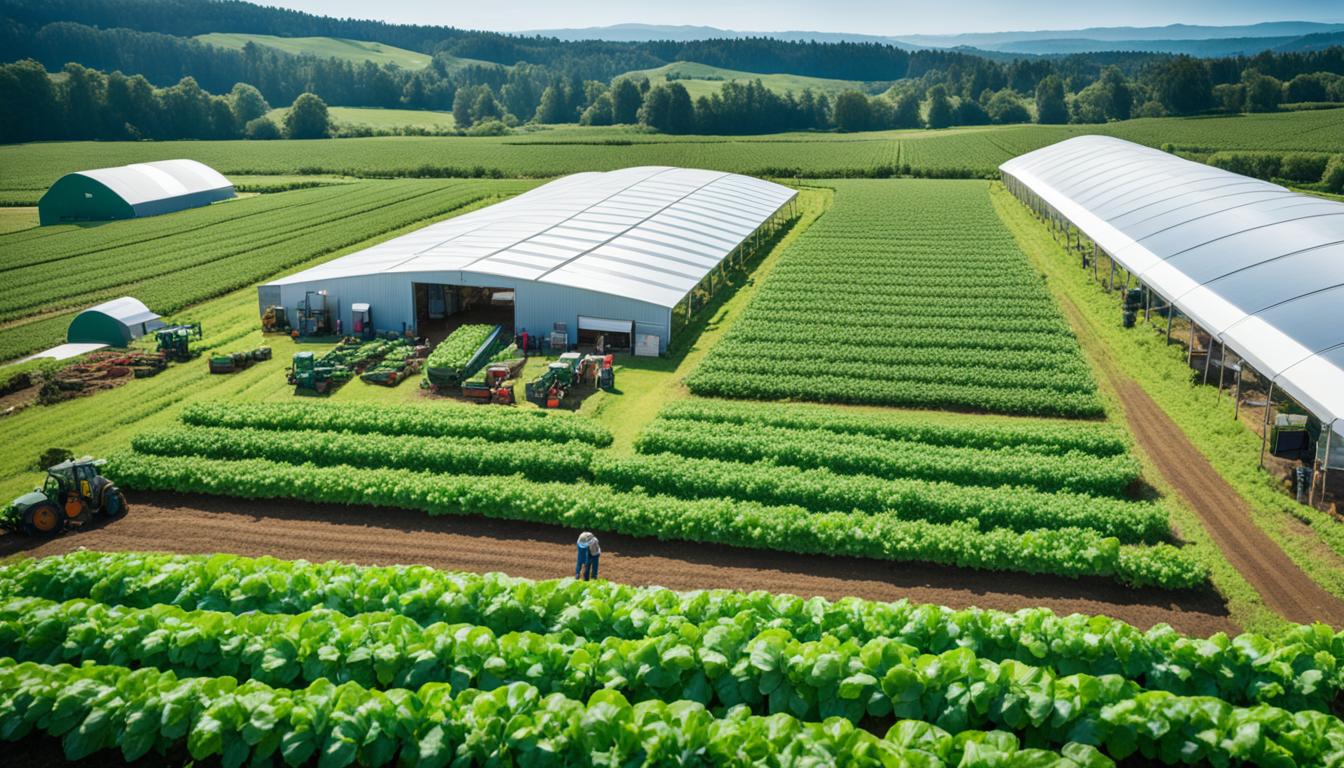
Spanish farming cooperatives like Cosanse and Anecoop bring together thousands of farmers. They are a big part of Spain’s agriculture. For instance, Cosanse is run by 800 farmers who jointly make decisions. Profits and losses are shared. It has 75 paid workers. Anecoop joins 68 cooperatives with 27,000 farmers. Together, they work to sell their produce well. This shows how important cooperative farming is in Spain.
In Catalunya, Mas la Sala is a great example of green farming. It focuses on making the land better and being part of the community. Mas la Sala uses a different way of leading. Six people share leading the different parts of the farm. This encourages everyone to work together. They aim to make food production better for the planet.
In Spain, cooperative farming is a big success. More than 3699 farming co-ops made 30,556 million euros in 2019. They led to over two-thirds of the farming output, playing a key part in the economy.
What’s impressive is how many people are part of these co-ops. Over a million members and 112,000 workers show the model’s strength. Also, most co-ops are ranked top in quality.
These co-ops are mostly found in areas like Andalusia and Castilla la Mancha. This focus helps these places grow strong, leading to better lives for the people. It’s all about making a community and the environment better.
Investing in these co-ops helps the society and the planet, meeting the Sustainable Development Goals.
Technology is also key for these co-ops in Spain. They use things like GPS for better farming and caring for animals, leading to smarter use of resources. This helps the land and the business.
Cooperative farming has really made a difference in Spain. It has brought new ways of farming that are good for everyone. These co-ops don’t just help earn money. They build strong communities and take care of the earth.
| Metric | Value |
|---|---|
| Number of Cooperative Companies (2019) | 3699 |
| Turnover (Million Euros) | 30,556 |
| Final Agricultural Production Representation | 68% |
| Total Members | Over 1 Million |
| Total Employment | 112,000 |
| Concentration Regions | Andalusia, Castilla la Mancha, Castilla y León |
| GD Percentage Contribution (Andalusia) | 25% |
During Franco’s rule, the Mondragon Corporation began. It marks a big change from making big profits to creating value for the community. Now, it’s the top group of worker-owned companies globally, with 105 firms and nearly 80,000 employees. It has big impacts, from industry to banking, education, and farming, helping Spanish cooperative farming grow.
Mondragon works in white goods, retail, finance, and teaching, with a big global reach. Its setup helps start new businesses and jobs, living by cooperative farming Spain‘s values. It inspires cooperatives worldwide.
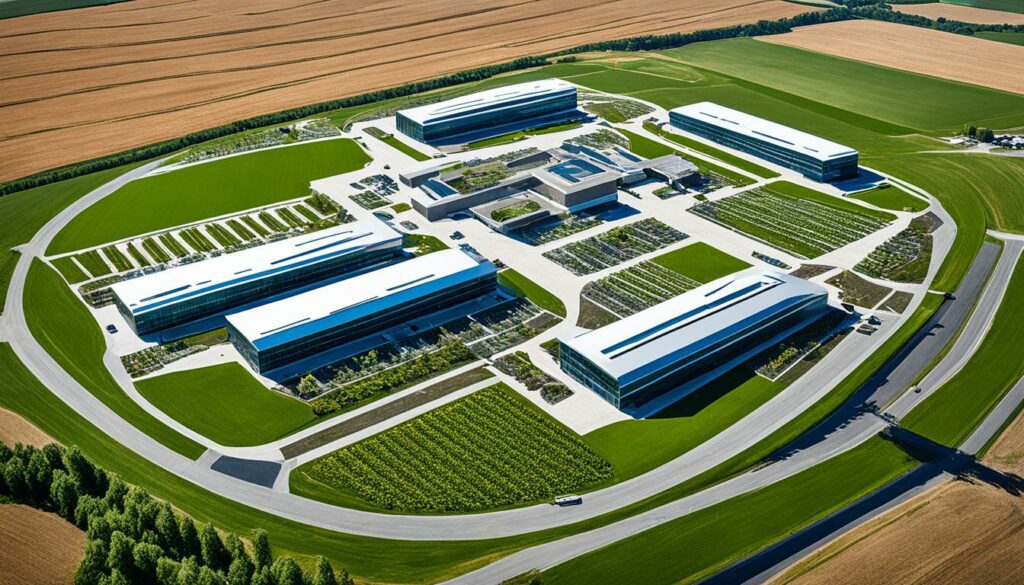
Mondragon stands out with its fair pay. The average CEO earns only six times more than their lowest-paid worker. This is a big difference from the US, where CEOs make hundreds of times more. Fair pay helps the community stay strong and united.
To become an owner, you need to put in €15,000. Laboral Kutxa, Spain’s third-largest bank, helps by offering a loan at 1% interest over ten years. This shows Mondragon’s focus on including and supporting everyone, making the area stronger.
The Basque region, where Mondragon is, has many cooperatives. The area is prosperous, with no poverty seen. It’s a great example for cooperative farming Spain, showing how cooperatives change lives.
Following open and democratic rules, Mondragon’s hundreds of projects do the same. Georgia Kelly has praised their education, and many visit Mondragon to learn, enhancing its educational role.
Mondragon town and its region prove how cooperatives can boost society and the economy. As more global cooperative efforts emerge, Mondragon sets a high standard for fair, community-centred businesses of the future.
The following table offers key data on Mondragon’s Spanish cooperative farming achievements and broader impacts:
| Aspect | Statistics |
|---|---|
| Employee Strength | 80,321 people in 289 companies |
| Cooperative Businesses | 105 businesses with nearly 80,000 worker-owners |
| CEO Salary Ratio | 6 times the lowest-paid worker |
| Worker Ownership Investment | €15,000 with a loan option at 1% interest |
| Mondragon Population | 23,000 inhabitants |
The Mondragon Corporation is a leading figure in the Spanish cooperative industry. It shows how solidarity and democratic governance can lead to success. With over 160 cooperative ventures, Mondragon has over 21,000 worker-owners. These members actively take part in the decision-making and benefit from the profits, reflecting Mondragon’s unique values.
Mondragon highlights the power of working together and making decisions as equals. It plays a big part in the economy, making up 2% of the Basque provinces’ economy. In Guipuzcoa, it’s even more significant, at around 14%. In the city of Mondragon itself, up to half of the workforce are part of the cooperatives. Workers share in the profits and have equal say in how things are run.
Mondragon has not only weathered economic storms but thrived, showcasing profitability twice the average of Spanish corporations in 1980.
Mondragon is known for its unique governance. Ventures allow workers and consumers to run things together. This brings many viewpoints into play and helps the cooperative stay strong. In this structure, worker-members put in money. This money stays until they retire, supporting business growth over time.
Mondragon is not just in Spain; it has a global reach. It operates in thirty-five countries and employs over seventy-five thousand people. It includes overseas workers in its cooperative model, further spreading its inclusivity. Mondragon’s global success sparks an interest in cooperation worldwide. It’s a key player in promoting teamwork and mutual benefits everywhere.
| Indicator | Value |
|---|---|
| Total cooperative enterprises | 160+ |
| Worker-owners | 21,000+ |
| Economic impact in Basque provinces | 2% |
| Economic impact in Guipuzcoa | 14% |
| Cooperative members in Mondragon | 50% |
| Industrial products exported | 30% |
| Global revenue | $14 Billion |
| Employees worldwide | 75,000+ |
Mas la Sala shows how farming coops in Spain lead in regenerative farming. They stand for farming that is good for both the land and the people. This coop uses a mix of ways to sell, like sending out fresh produce kits right to families. They keep prices fair and often beat what big shops charge.
This coop builds its name by valuing people over official labels. They win over customers by keeping it personal and reliable. Their hard work has helped them shine in the crowded market of Spanish farming.
They are serious about living in a way that doesn’t harm the earth. They team up with others to cut back on harmful emissions through clever plans. For instance, they’re into making sure animals stay where they need to without fences.
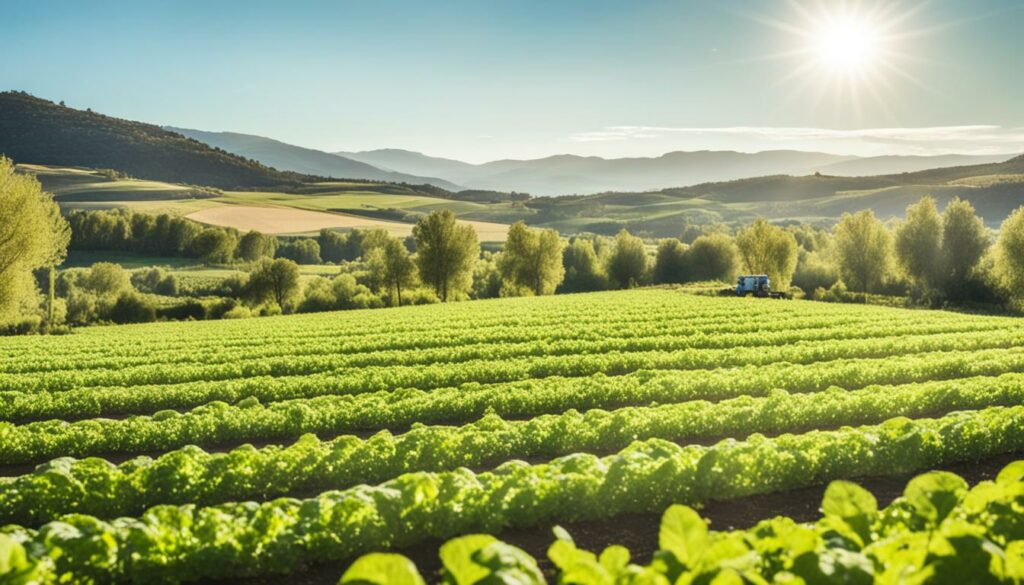
Mas la Sala’s way of doing business is strong even when markets are tough. In places like Almería, Spain, cucumber farmers get little of the final sale money. But Mas la Sala skips the middlemen, making sure farmers get more of what they deserve.
They also tackle the big issue of how farming can hurt nature. Across Europe, birds are vanishing because of aggressive farming. To fight this, Mas la Sala sticks to farming in a way that doesn’t hurt the balance of nature.
They know farming can weigh heavily on the planet. It makes up almost a third of all harm we do, despite only needing about a fifth of the world’s land. Their work points to a better future where farming helps, not harms, us and nature. They aim for a brighter future where communities are strong thanks to farming that works with nature.
| Aspect | Traditional Farming | Regenerative Farming |
|---|---|---|
| Environmental Impact | Significant ecological footprint, 30% contribution | Reduced carbon footprint, preservation of biodiversity |
| Economic Model | Intermediary-dependent, farmers receive 12% of final price | Direct selling, fair income distribution |
| Biodiversity | 60% decrease in bird biodiversity due to intensive practices | Focus on soil health, biodiversity preservation |
| Community Engagement | Limited direct interaction | Strong community presence, customer trust |
In Spain, the cooperative farming scene is rich and varied. The Basque Country and Catalonia stand out with their top-notch agricultural cooperatives. These areas owe much to the Mondragon Corporation, leading the way with strong cooperative models. The Basque Cooperative Confederation (KONFEKOOP) and the Catalan Cooperative Confederation have been key. They’ve helped a lot with creating jobs and making a positive mark on society.
KONFEKOOP is at the heart of the Basque economy. It’s deeply rooted in a history of working together in farming. Thanks to early laws and efforts, Spain saw a big jump in farm unions. By 1912, there were 1,772, from just 6 in 1906. Laws like the Associations Act of 1887 and the Farm Unions Act of 1906 were critical. KONFEKOOP’s work highlights the ongoing success of Spanish agricultural cooperatives. It’s played a big part in reducing joblessness and boosting the region’s economy.
In Catalonia, the cooperative movement is also strong, thanks to the Catalan Cooperative Confederation. It covers sectors like services, construction, industry, and farming. Since the early days, with the first Cooperatives Act in 1931, coops have been important. Even with tough government checks, they’ve shown they can last and grow. Today, farming cooperatives in Catalonia are vital, adding a lot to the Social Economy.
Both in the Basque Country and Catalonia, cooperative models are shown to work well. They help the economy by providing jobs and bring people together. This community and participation are key, especially when times are tough. Spanish agricultural cooperatives continue to be very important. They carry on the tradition of cooperative growth from the early 20th century.
| Region | Key Cooperative Entity | Economic Impact |
|---|---|---|
| Basque Country | KONFEKOOP | Job creation and economic stability |
| Catalonia | Catalan Cooperative Confederation | Broad sector coverage, sustainable growth |
To sum up, the push for cooperative farming led by groups like KONFEKOOP and the Catalan Cooperative Confederation is crucial for Spain. Their work is felt in the economy and society. They are vital parts of the Spanish agricultural scene.
In Spain, the role of cooperative farming is huge. In 2019, 3,699 cooperatives made €30,556 million. This is 68% of the country’s agricultural output. It shows how working together boosts productivity and the economy.
More than one million people are part of these cooperatives. They provide around 112,000 jobs. Most of these are top-level cooperatives, showing their deep connection to agriculture.
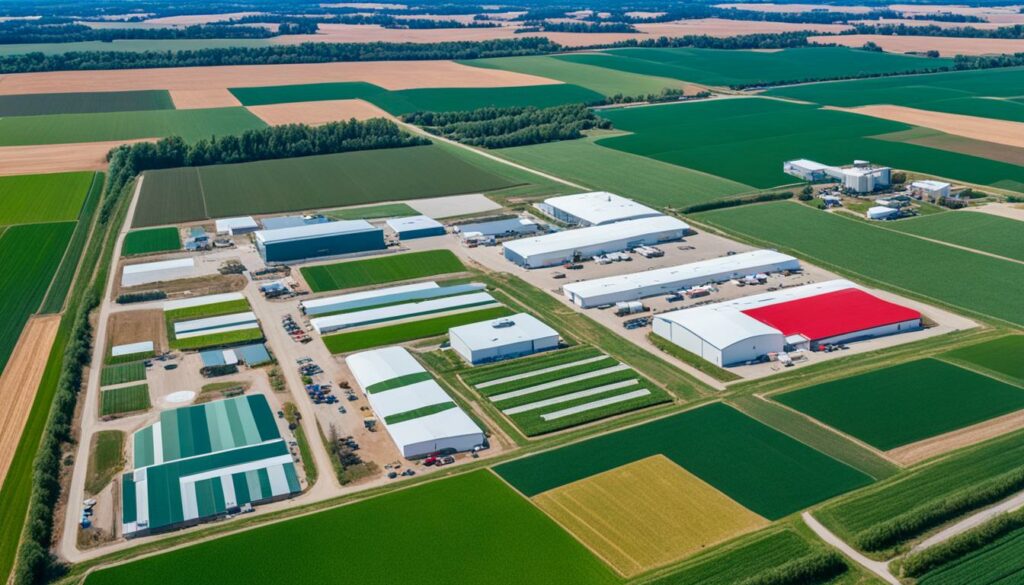
The heart of cooperative farming in Spain lies in Andalusia, Castilla la Mancha, and Castilla y León. Andalusia is on top with 713 cooperatives. These regions show their power in farming. Andalusia also leads in sales, followed by other areas.
Agricultural coops help the economy and the environment. They mainly work in Fruits and Vegetables, Olive Oil, and Supplies. This shows their wide-ranging impact.
Investing in these cooperatives helps farming stay sustainable. Studies with 282 investors show what they find important in cooperatives. This includes having a say and earning a profit. It proves that people see value in joining these efforts.
Agricultural cooperatives are key to building strong communities and businesses. They are essential for the economy and for people coming together. They show that working as a team in farming makes everyone stronger.
Since 2006, these cooperatives have increased jobs by 17%. They are also big in exports, making up 31.3% of sales. This shows their important role worldwide.
These farming models are vital for facing challenges and growing. They have formed major groups that are very successful. Spanish agricultural cooperatives are a great example of what teamwork can achieve.
Regenerative farming practices in Spain are making a big difference in the way we treat the land. These practices, seen in places like Mas la Sala, focus on keeping the soil healthy and rich with biodiversity. Spanish cooperatives lead the charge in this movement for sustainable agriculture.
Healthy soil and a diverse ecosystem are vital for successful farming in Spain. Cooperatives check soil quality and fix any issues using local solutions. They also plant many different species and look after natural spaces to help ecosystems thrive.
The Spanish cooperative farming industry uses a complete approach to farming. This includes moving animals in ways that copy how they would naturally graze, which is good for the soil and plant life. These methods also help save water and make the land more productive over time.
In Spain, regenerative farms don’t just stick to crops. They try various activities to bring in money and connect with the community. This helps them stay strong even through tough economic times. And many reports show how well these methods work.
| Project Details | Information |
|---|---|
| Total Project Budget | €274,960.00 |
| Project Duration | November 2016 to May 2019 |
| Cooperation Case Studies | 40 |
| National Reports | 6 |
| Training Modules | 4 |
| Languages Available | English, German, Spanish, Slovenian, Czech, Italian, French |
Studying these Spanish projects shows us how important they are for sustainable farming. They are showing the way to a better future for farming in Spain.
Spanish agricultural coops have seen much success, but they still face tough challenges. A big issue is the lack of farm equipment designed for their methods. This slows down their work and makes it harder to grow. It shows the need for new farming tools.
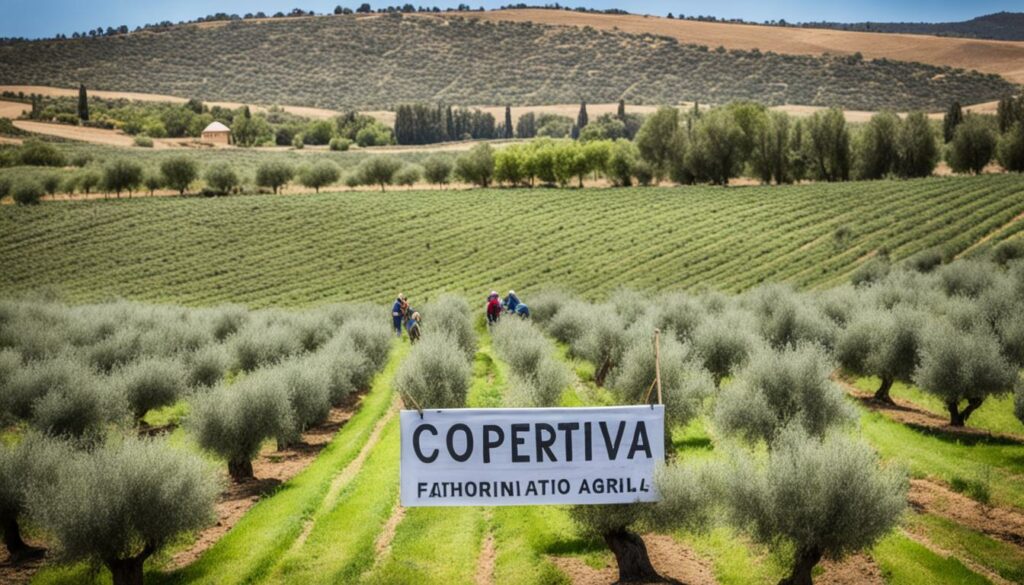
Looking closer at the rules for farming cooperatives, we find even more problems. These rules don’t fit well with ways of farming that protect the environment. For example, a cooperative called Mas la Sala waits a long time to make money because they’re letting their land recover. To cope, they use what they have, like old tools, to not spend too much. They also use some quicker farming methods to make money sooner.
The numbers also tell a tough story. Many farms in Spain are very big but most are quite small. This means smaller cooperatives don’t have as many resources. It often makes them struggle with money. About a third of these cooperatives face this issue.
These coops also have to deal with big farms and less help from the government. Now, they earn less help from the government but have to compete more with big farms. This makes things financially hard for them. Almost 40% can’t use new farming tech, making it harder to farm better or greener.
Getting their goods to buyers is also tough. Half the cooperatives say selling their products is hard. Less people are joining cooperatives now, and most members are older. This shows they need younger people to join and help out.
But, these cooperatives are doing their best. They are working together more and reducing costs by 20%. They are also selling more goods abroad. Some are farming without chemicals, which is good for the environment.
The future looks hopeful. More cooperatives are making money from renewable energy and from visitors who come to see their farms. They are also doing more research and trying new ways to farm. This will keep them strong and ready for what’s next.
| Challenge | Percentage / Data |
|---|---|
| Financial difficulties | 33% |
| Lack of modern farming technologies | 40% |
| Marketing difficulties | 50% |
| Decrease in government subsidies | 15% |
| Competition from corporate farms | 30% |
| Average age of cooperative members | 55 years |
| Decrease in cooperative membership | 20% |
In Spain, the way cooperative farms work is deeply influenced by complex laws and policies. The government actively supports them, making sure they meet high standards. This support helps cooperatives to grow and stay strong.
Spain’s laws on cooperative farming are thorough. The 1999 Law, for example, explains what cooperative societies are and how they start. Another law from 1990 talks about taxes, making things clear for cooperative farms. It makes sure they know how to deal with taxes properly. Also, a 1998 law change, concerning fuel use, gives cooperatives some tax breaks.
Spain’s government puts a lot of money towards helping farmers and protecting the land. For instance, a new law set aside €2.2 billion to help during a drought, with €636 million just for farmers. Then, the CAP got €148 million. This money supports farmers, helping make their work more eco-friendly and productive. Cooperative farming benefits a lot from this help.
Still, following the rules is very important for cooperatives. They must use things like plant protection products carefully, as detailed in national rules. Safety and following the law are key. Also, there is help with insurance for farmers. This support pays for most of their insurance costs, but they must still follow all the rules.
Together, these laws and government actions are crucial for Spanish farming. They lead the sector, making sure it follows local and EU rules. With this support, cooperative farms can do well, showing how state and community efforts can build a strong farming future.
In Spain, cooperative farming shines with impactful examples like Mondragon and KONFEKOOP. They make a big difference by not only improving farming but also boosting the economy. For instance, in 2019, they had over 1 million members and a huge turnover. This added up to 68% of the agricultural products.
Cooperative farming helps Spain’s economy by focusing on working together. These groups have grown a lot over the years, showing they can handle tough times. From just 6 unions in 1906, there were 1,772 six years later, proving this way of farming works well.

Cooperative farming in Spain began to get legal support in the 1930s and 40s. This made them the main type of farming organisation until the 1990s. With laws helping them out, more and more farmers decided to join. This has made cooperative farming very strong in Spain.
These cooperatives are seen as part of the social economy. This helps them have a stronger say in Europe. They employ over 112,000 people, showing Spain’s dedication. Most are found in places like Andalusia and Castilla y León. They help these rural areas grow by providing jobs and keeping farms going.
What’s interesting is they often work in areas big businesses ignore. So, they play a key role in these places’ farm economy, helping them grow too.
| Statistic | Value |
|---|---|
| Number of agricultural cooperative companies (2019) | 3699 |
| Total turnover (2019) | 30,556 million euros |
| Contribution to final agricultural production | 68% |
| Employment provided | 112,000 individuals |
| Membership | Over 1 million members |
| Concentration regions | Andalusia, Castilla la Mancha, Castilla y León |
In Spain, agricultural cooperatives do more than make money. They strengthen the social fabric of rural areas. These groups create a feeling of togetherness and teamwork. This can be seen in their efforts to include everyone and share responsibility. This detailed article talks about the social wins from working together in farming.
There are over 3,699 cooperatives in Spain. They made 30,556 million euros in 2019. This was 68% of the country’s entire farming output. Their success isn’t just about money. It changes lives and creates jobs for over 112,000 people. Most of these jobs are in places like Andalusia and Castilla y León.
Not only do these cooperatives help economically, they’re also great for the environment. They push for farming that doesn’t harm the planet. They’re a key part of making agriculture last for generations. Supporting them is vital for our future and helps communities stay strong.
Investors in Spain are taking more interest in these cooperatives. After asking 282 people, a study found that many liked the idea of investing in such groups. This interest shows that these farms are not only good for business but also for the world.
Most of Spain’s cooperatives are part of bigger groups. They make up 91% of all cooperatives in the country. Their way of working creates stronger communities. They are a model for how agriculture should be done today, focusing on making money while also helping society.
Cooperative farming does more than grow crops; it builds strong communities. It makes rural areas better places to live. By focusing on the environment and people, these groups are essential for Spain’s future. They show us all a better way to farm that benefits everyone.
In Spain, cooperative farming is changing through smart farm tech and new methods. Recently, 273 people came together at an event led by Agri-food Cooperatives of Spain. They discussed how new tech is improving farming.
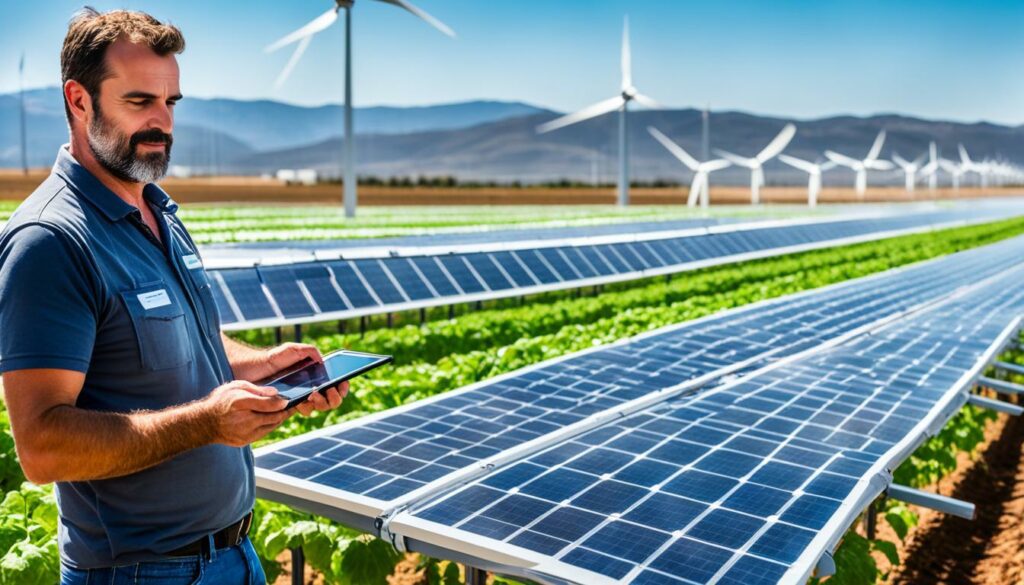
At farms like Mas la Sala, GPS and virtual fencing are big helpers. They control where livestock moves. This means better soil, pastures, and less overgrazing. It’s key for eco-friendly farming.
Spanish farms are getting high-tech gear like Anecoop, Dcoop, EaGroup, and others. They’re becoming digital to save money and farm better. They choose machinery that’s good for the earth and boosts production.
Working with tech partners is vital for farm tech. Projects like the 30×5 aim to up farm output with data and teamwork. The effort by UNICA Group, using loads of data, is a great example. These group efforts make farms work smarter.
| Participants | Number of Participants |
|---|---|
| Cooperatives of Farmers | 43 |
| Private Companies | 133 |
| Public Sector (Universities, Policy Makers) | 42 |
| Financing | 11 |
| Other Agri-food Organizations | 44 |
The push for digital change in farming welcomes young people. Spain’s Agriculture Ministry and Economy Ministry are making internet better in rural areas. This plan helps farming go digital.
The potential growth of cooperative farming in Spain is very exciting. It focuses on a future that’s both good for the environment and for people. Cooperative farms in Spain help by keeping agriculture sustainable. They also boost rural places and help their communities grow.
In 2019, Spain had 3,699 coop companies. These companies made an amazing €30,556 million. This was 68% of all the farm products in Spain. The cooperatives together had over 1 million members and gave jobs to around 112,000 people.
Most of these farm cooperatives are in first and second categories. They’re mostly in Andalusia, Castilla la Mancha, and Castilla y León. This map shows how important they are in helping local farmers and boosting their areas’ economies.
The social economy in Spain is growing fast, mostly thanks to farm cooperatives. A study asked 282 investors about how they’d like to invest in these coops. They thought about voting rights, making profits, and the risk involved. The study used special math to understand what the investors preferred.
Spanish cooperative farming has grown a lot, thanks to better rules. Big cooperative companies are now making lots of money. Before the 1990s, coops and Agricultural Transformation Companies were all that existed. They started thanks to the Catholic Church’s ideas in the late 1800s.
Cooperative farming is very good for small villages. It makes jobs and lets farmers stay in their home areas. European farm cooperatives, Spain included, follow Europe’s farming ideas. These ideas are about more than just farming, they’re about helping rural communities thrive.
Looking ahead, cooperative farming in Spain has a bright future. It points the way to an agriculture that’s good for nature and people. Cooperative farming offers stability for rural places. It also means farming that’s fair and green for everyone.
Cooperative farming in Spain shines as a model of green agriculture. Its proud history links back to laws passed in 1931 and 1942. These laws support cooperative work. Such efforts have made a huge impact on Spain’s farming economy.
In 2019, there were about 3,699 farming co-ops in Spain. They made a total of 30,556 million euros. This represented around 68% of the country’s final farm products. The cooperative way has helped them face early issues, like not having enough tools.
Co-ops in Spain found success thanks to teamwork, government help, and the dedication of its members. New technologies such as GPS and virtual fences played a big role too. They helped make farming processes better.
In short, cooperative farming in Spain is a success story. It blends making money with looking after the planet and helping society. These co-ops have over a million members and provide 112,000 jobs. They show that working together for the good of all is key.
Moving forward, the model of cooperative farming looks set to grow. It suggests a bright future for farming in Spain. This future promises more success stories, with Spain taking a lead in this kind of farming.
In Spain, the cooperative agriculture model joins farmers to reach green goals together. It’s about unity, shared work, and operating in a way everyone has a say. This method boosts the local economy and cares for the environment.
Cooperative farming boosts how resources are used. It helps the soil last longer and encourages better ways to share wealth. This way of farming also creates jobs and is good for the earth, making it a win for everyone.
The Mondragon Corporation sets a great example of how cooperatives work. It started in a tough time in history and now involves many areas, from making things to money. Mondragon is known for sharing its earnings fairly and caring about its people and places.
At Mondragon, they believe in working together and having a say. Their approach lets both workers and customers lead in some places. They also focus on including workers from around the world. Profits go back into the business, helping it keep growing and working well together.
Mas la Sala looks after the land and its many living things. They do this by moving animals around, which is really good for the soil and plants. They also do different things to make money and look after the grass better with high-tech ways.
In the Basque Country and Catalonia, cooperatives help make jobs and deal with joblessness. They show that working together can keep places growing even in hard times. This is a big deal for the area’s economy and people.
Cooperatives mix making money with looking out for each other. They help keep jobs around, grow communities, and welcome new ideas. This makes a fair and friendly place to work for everyone.
In Spain, cooperatives focus on keeping the soil healthy and using the land well. They move animals from place to place and turn to local ways to fix soil problems. This makes farming there strong and able to last.
Some challenges in farming include learning a whole new way and waiting for the land to improve. Also, finding the right tools can be tricky. Mas la Sala deals with these by smartly reusing old tools and mixing new ways with old ones.
Spain’s rules help by giving cooperatives a hand and setting standards to follow. The aim is to make sure they keep being fair and working together well. This keeps them strong and helps them do good for the long haul.
Farming together not only makes jobs but spreads wealth evenly. This makes the business tough in hard times and good for growing. It’s a way of working that takes care of the community and the land.
These cooperatives help bring people together and feel like they belong. They keep both the land and the markets safe, making life better for everyone. It’s a way of farming that looks after people and places, helping things get better.
Spanish farms use cool tech like GPS for animals and smart fences. They also team up with tech experts to make farming smarter. This helps them do better for the land and the people working there.
The future looks bright for cooperatives in Spain. Their way of doing things is seen as a good mix for the planet and the economy. With more support and new ideas, they are set to keep growing and doing well for everyone.